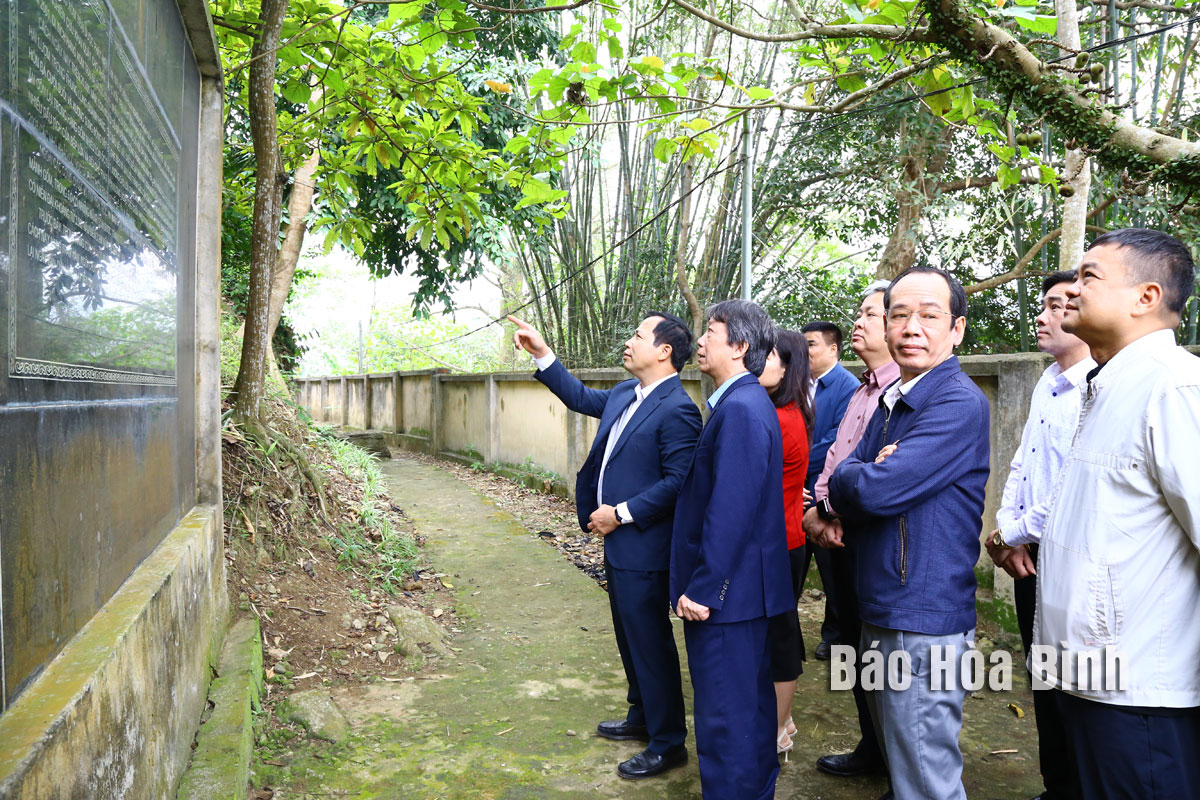
A delegation led by Vice Chairman of the Hoa Binh provincial People’s Committee Nguyen Van Toan on March 13 examined the implementation of a plan on preserving and bringing into play the values of the Muong ethnic culture and the Hoa Binh Civilisation for the 2023 - 2030 period in Lac Son district.
Vice Chairman of the provincial People’s Committee
Nguyen Van Toan and other officials make a fact-finding trip to the relic site
of Trai Hamlet Cave in Tan Lap commune, Lac Son district.
The delegation inspected the planning of the
restoration and upgrade of the national relic sites of Trai Hamlet Cave in Tan
Lap commune and Vanh Village Stone Shelter in Yen Phu commune. These are
outstanding and famous archaeological sites dating back to the Hoa Binh
Civilisation.
Trai Hamlet Cave was listed as a national relic
site by the Ministry of Culture and Information (now the Ministry of Culture,
Sports and Tourism) in 2001 while Vanh Village Stone Shelter was granted the
status in 2003. The Hoa Binh provincial People’s Committee is submitting a
scientific dossier to the Prime Minister to seek the recognition of these two
relic sites as those of special national importance.
Under the plan on preserving and bringing into
play the values of the Muong ethnic culture and the Hoa Binh Civilisation for
2023 - 2030, the 3.08ha relic site area of Vanh Village Stone Shelter is
maintained while the area zoned for protection is 5.407ha, about 2.237ha larger
than planned. Trai Hamlet Cave has its relic site area kept at 1.48ha while the
area zoned for protection is 1.55ha, about 0.75ha larger than planned. As the
relic site of Trai Hamlet Cave holds much potential and advantages for
developing spiritual and leisure tourism, its area is set to be expanded to
9.5ha.
Roads to the relic sites, as well as their
exhibition halls, offices, spaces for events and festivals, service areas, and
other facilities will be expanded.
At the meeting with local authorities, Vice
Chairman Toan asked the Lac Son district People’s Committee to work closely
with relevant departments and sectors along with the consultation unit to
ensure the quality, long-term vision, and law adherence of the project on
restoring and upgrading the national relic sites of Trai Hamlet Cave and Vanh
Village Stone Shelter.
During the restoration and upgrade, the district
needs to consult with culture researchers to ensure the project meets the
requirements for preserving and promoting the relic sites’ cultural,
historical, and spiritual values in order to capitalise on the core values of
the Muong ethnic culture and the Hoa Binh Civilisation for sustainable tourism
development.
With an increasingly vibrant and widespread emulation movement aimed at building cultured residential areas and cultured families, Yen Thuy District has been making steady progress toward improving both the material and spiritual well-being of its people, while fostering a civilized, prosperous, beautiful, and progressive community.
Once lacking recreational spaces and community facilities, Residential Group 2 in Quynh Lam Ward (Hoa Binh City) has recently received attention for the construction of a new, spacious, and fully equipped cultural house. The project followed the model of state support combined with public contributions in both labor and funding.
The "All people unite to build cultural life" movement, which has been effectively integrated with Kim Boi district’s socio-economic development goals, is fostering a lively spirit of emulation across local residential areas, hamlets, villages, public agencies, and enterprises. In addition, through the initiative, traditional cultural values are being preserved and promoted, while community solidarity and mutual support in poverty reduction and economic development are being strengthened.
A working delegation of the Hoa Binh provincial People’s Committee led by its Permanent Vice Chairman Nguyen Van Toan on June 11 inspected the progress of a project to build the Mo Muong Cultural Heritage Conservation Space linked to tourism services in Hop Phong commune, Cao Phong district.
Born and growing in the heroic land of Muong Dong, Dinh Thi Kieu Dung, a resident in Bo town of Kim Boi district, in her childhood was nurtured by the sweet lullabies of her grandmother and mother. These melodies deeply imprinted on her soul, becoming an inseparable part of her love for her ethnic group's culture. For over 20 years, this love for her hometown has driven Dung to research, collect, and pass down the cultural values of the Muong people to future generations.
In the final days of May, the Ethnic Art Troupe of Hoa Binh Province organized performances to serve the people in remote, mountainous, and particularly disadvantaged areas within the province. These were not just ordinary artistic shows, but they were the meaningful journeys aimed at spreading cultural values, enhancing the spiritual life of the people and contributing to the preservation of ethnic minority cultural identities.



